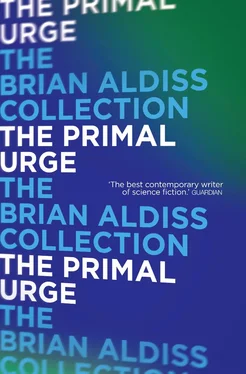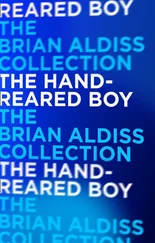BRIAN ALDISS
The Primal Urge
This absurd attempt to popularise various sorts of morality is dedicated to Eddie Cooney and Oscar Mellor because they were the first to hear about it in ‘The Gloucester Arms’ – and for better reasons.
Contents
Title Page BRIAN ALDISS The Primal Urge
Dedication This absurd attempt to popularise various sorts of morality is dedicated to Eddie Cooney and Oscar Mellor because they were the first to hear about it in ‘The Gloucester Arms’ – and for better reasons.
Author’s Note Author’s Note Just as it would be difficult – and fatuous – to write a history of twentieth-century art without mentioning Picasso, I have found it impossible to draw this contemporary picture without mentioning a number of the pillars of our society, from Mr Jack Solomons to Air Chief Marshal Dowding; I have presumed enough to impute to some of these public figures opinions on the hypothetical matters contained in my novel. One particular victim is Mr Aldous Huxley, who has most kindly permitted me to take this liberty with him. May I beg the other sufferers to be similarly indulgent, reminding them that such is the price of fame and semel insanivimus omnes ? Of course I realise that their actual opinions could hardly fail to differ from those I have ascribed to them. But their presence here, even if involuntary, has lent me moral support in rough waters. The same seeking for lifelines has caused me to use a number of branded goods in my pages. I would, accordingly, like to thank the manufacturers of Kosset Carpets, Odo-ro-no, Cooper’s Oxford Marmalade and several automobiles for the sense of security their products have afforded me. Likewise with institutions. The Harlequins, the British Government and the National Book League are real, and I for one am glad it is so. But the representatives of the British Government who appear in these pages are not real; my Minister of Health, for instance, is no relation to any past, present or forthcoming Minister of Health; for this also one may be grateful. These qualifications accepted, all characters in this book are fictitious and are certainly not intended to represent anyone living or dead; the institutions in it are purely make believe; such actions and opinions as are ascribed to these characters or institutions are imaginary; even the weather is too good to be true. Readers are asked, nevertheless, to bear in mind the lines of George Santayana: Even such a dream I dream, and know full well My walking passeth like a midnight spell. But know not if my dreaming breaketh through Into the deeps of heaven and hell. I know but this of all I would I knew: Truth is a dream, unless my dream is true. B.W.A.
Introduction Introduction This light-hearted novel has a juicy futuristic edge: someone has invented an electronic device that indicates if the person you are looking at – or talking to – is sexually attracted to you. If attraction is detected, an ER (Emotional Register) – like a coin on one’s forehead – flares with a pinkish glow. And then? Well, the next move is up to you … Real figures from the twentieth century feature heavily in The Primal Urge : Rock Hudson, Dr Kinsey, Bertrand Russell, Patience Strong, Eric Linklater, Gaudi and, most importantly, Aldous Huxley are referenced in the narrative. Huxley was a writer I particularly admired; in The Primal Urge I have him speak up for the ERs. I wrote to him in California, asking his permission to include a quote, and to my absolute delight received a friendly letter of consent in return. Think of it. A real letter from Aldous Huxley! The least I could do, in my estimation, was to offer him a copy of the finished book. A tactful second letter from him pleaded partial blindness … By the late fifties, when I began to formulate the idea for the book, I was on the way to becoming an established writer. I had been appointed Literary Editor of the Oxford Mail. I had become rather a man-about-town and was enjoying life. London, with parts still ruinous from the air raids of WW2, was heaving itself back to various fresh pleasures. Khaki was no longer the fashion. The text of The Primal Urge reflects that enjoyment. Elegant and prankish, it says things like, ‘Now they were together again, the evening was riding on their shoulders once more like a tame raven.’ It puts its protagonist in a swimming pool with the woman he calls Rangy: ‘Her face and the reflections of her face seemed to palpitate before him like butterflies in a cupboard.’ The Canadian physiotherapist – if indeed that is what he is – Croolter, turns out to have the full name of Croolter B. Kind. The plot drifts pleasantly along, ending with the lovers in London, arm in arm, emerging into the air of the capital, evening-calm, gasoline-sweet … The British version of The Primal Urge appeared in 1961. I had some trouble in getting it published; when it was accepted, the British publisher asked, ‘Couldn’t you clean it up a little?’ The American publisher, on the other hand, was asking me to make it a bit dirtier … Nowadays, I doubt such questions would arise. The mores of 1961 have more or less sunk below the sexual waterline. Waterlines themselves have also sunk. Brian Aldiss Oxford, 2012
PART ONE: A Putative Utopia PART ONE
1 A Fox with a Tail
2 A Towel in Common
3 At the IBA
4 ‘You Don’t Feel a Thing’
5 Breakfast with Paper and White Nylon
6 An Interesting Theory
PART TWO: Browbeaten but Victorious?
7 As Natural as Navels
8 The Light that Failed
9 Whatever the Band Plays
10 Scryban Becomes Involved
11 ‘A Bit of a Let Down’
12 The Invaders Have Nice Manners
13 Hot Pursuits, Cold Shoulders
14 Camera Obscura
15 Affairs of State
About the Author
Copyright
About the Publisher
Just as it would be difficult – and fatuous – to write a history of twentieth-century art without mentioning Picasso, I have found it impossible to draw this contemporary picture without mentioning a number of the pillars of our society, from Mr Jack Solomons to Air Chief Marshal Dowding; I have presumed enough to impute to some of these public figures opinions on the hypothetical matters contained in my novel. One particular victim is Mr Aldous Huxley, who has most kindly permitted me to take this liberty with him. May I beg the other sufferers to be similarly indulgent, reminding them that such is the price of fame and semel insanivimus omnes ? Of course I realise that their actual opinions could hardly fail to differ from those I have ascribed to them. But their presence here, even if involuntary, has lent me moral support in rough waters.
The same seeking for lifelines has caused me to use a number of branded goods in my pages. I would, accordingly, like to thank the manufacturers of Kosset Carpets, Odo-ro-no, Cooper’s Oxford Marmalade and several automobiles for the sense of security their products have afforded me.
Likewise with institutions. The Harlequins, the British Government and the National Book League are real, and I for one am glad it is so. But the representatives of the British Government who appear in these pages are not real; my Minister of Health, for instance, is no relation to any past, present or forthcoming Minister of Health; for this also one may be grateful.
These qualifications accepted, all characters in this book are fictitious and are certainly not intended to represent anyone living or dead; the institutions in it are purely make believe; such actions and opinions as are ascribed to these characters or institutions are imaginary; even the weather is too good to be true. Readers are asked, nevertheless, to bear in mind the lines of George Santayana:
Читать дальше












